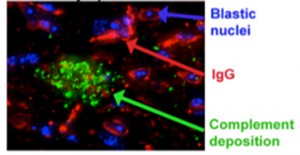Laboratory of Michael Carrithers, M.D., Ph.D.
Program in Neuroimmunology and Neurological Infections
The Carrithers laboratory focuses on basic innate immune signaling mechanisms, immune-mediated repair, and molecular determinants of treatment response to biological therapies.
Innate Immunity
Poly I:C, a synthetic mimic of dsRNA, activates the intracellular SCN5A channel that is expressed in human macrophages. From Jones et al., 2014
We have identified a novel mechanism of pattern recognition mediated by intracellular voltage-gated sodium channels. In human macrophages, one of these channels recognizes dsRNA and initiates anti-viral signaling. A genetically related channel in the yellow fever mosquito is activated by viral ssRNA and regulates insect innate immune pathways. These pathways are also relevant to immune-mediated repair in autoimmune conditions such as multiple sclerosis.
Pharmacogenomics of Multiple Sclerosis Treatments

Reduced EVA expression leads to an enhanced humoral response and lack of response to treatments similar to natalizumab. From Wright et al. 2013
We discovered a gene that is required for response to anti-alpha4integrin treatment in a mouse model of multiple sclerosis. The product of this gene, epithelial V-like antigen (EVA), limits the extent of B and T lymphocyte activation and migration following immunization and other inflammatory stimuli. The goal of this work is to develop individualized treatment approaches for patients with multiple sclerosis and related disorders.

